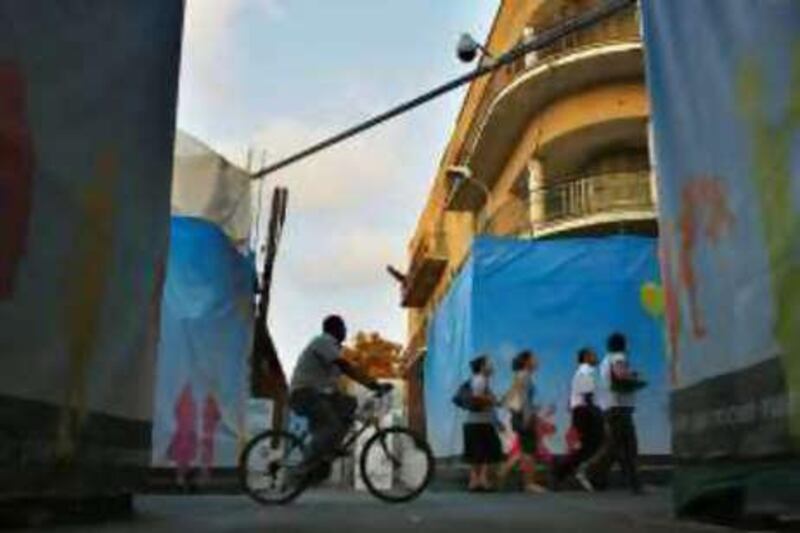NICOSIA // As he sipped an iced coffee at an upmarket cafe in Nicosia's bustling Ledra Street, Pavlos Pavlou showed little interest in comprehensive peace talks that begin in Cyprus today, which diplomats rate as the best chance in a generation to reunite the island.
"I've stopped following the Cyprus problem on the news because we've heard the same thing since 1974," the 43-year-old Greek Cypriot insurance company worker said. "I don't trust Turkey. Whatever it gained with the gun, it won't return with the pen." On the other side of Nicosia, the capital of the European Union's only divided member, Eralp Yucelt was equally downbeat as she sipped wine at a fashionable restaurant. "Talks come around every few years, but when it comes to the crunch, nothing happens," the 42-year-old Turkish Cypriot civil engineer said. "I could of course live with the Greek Cypriots again but on equal terms. Otherwise, it's a no-go, and I don't think the Greek Cypriots will accept us on equal terms."
For the first time in 34 years, each side will be represented at the negotiating table by a moderate leader committed to a settlement. The international community's fingers are crossed anxiously. Cyprus's division is a major obstacle to Turkey's aspiration of joining the EU while jousting between Nicosia and Ankara is hampering co-operation between the EU and Nato in such trouble spots such as Kosovo and Afghanistan.
After decades of repeated failures, it is hardly surprising that many ordinary people are disillusioned, mistrustful and wary of change. But diplomats argue there are new grounds for hope. And analysts believe that tangible progress in coming months of negotiations will encourage more optimism among ordinary Greek and Turkish Cypriots who will be required to endorse any deal in separate referenda.
"If people see a solution on the table - which they don't see today - things might change," Erol Kaymak, a Turkish Cypriot academic and polling expert, said. Andri Neophytou, a 39-year-old Greek Cypriot office worker, agreed - after expressing reservations. "We don't know what happens the day after we say 'yes' to an agreement. That's what scares us. Why take the risk of living together after 34 years apart?" she said at an ice cream shop in Ledra Street. "But if they get an agreement, I'll accept it - not for me, but for my three children."
Emine Hussein, a 46-year-old Turkish Cypriot businesswoman at a fashionable restaurant on the other side of Nicosia's dividing line, expressed similar sentiments. "I've got to be hopeful, but I don't think we'll get anywhere," she said. "I'd prefer two separate states, but would say 'yes' to a federated state if we had a solution." The good personal chemistry between Demetris Christofias, the president of the Greek Cypriot community, and Mehmet Ali Talat, the Turkish Cypriot leader, is regarded as vital. Both are pragmatic leftists who have known each other for years and share a degree of trust.
"If these two moderates cannot solve the Cyprus problem, then nobody can," said Hubert Faustmann, an associate professor of international relations at the University of Nicosia. Both sides agree to reunite as a bi-zonal, bi-communal federation under which the smaller Turkish Cypriot community would have political equality - although they differ on how this might work. The atmosphere has improved greatly since Mr Christofias's election victory in February.
Within weeks he and Mr Talat agreed to open a crossing point on Ledra Street, which had long been a symbol of division in the historic heart of Nicosia. The last concerted drive to reunite Cyprus ended acrimoniously four years ago when Tassos Papadopoulos, the hardline Greek Cypriot former leader, led his people in rejecting a United Nations settlement plan that he deemed pro-Turkish and unworkable.
The less prosperous Turkish Cypriots, longing to end their isolation, endorsed the UN blueprint in a separate referendum. A week later Cyprus, represented internationally by the Greek Cypriots, entered the EU with the Turkish Cypriots effectively left out in the cold and bitterly disappointed. UN mediators stepped in to arbitrate when the two sides failed to agree in 2004. This time any deal will be home-made, with the UN's Cyprus envoy acting as facilitator: a post recently given to Alexander Downer, Australia's former foreign minister.
Now if the two Cypriot leaders secure and sign a deal, they will be obliged to promote it to their people: neither will be able to claim meddling by outside powers. The two sides are said to remain far apart on substantive issues, although commentators say some progress has been made in preparatory talks on governance and power-sharing, EU matters and the economy. "But there are reasons to believe the talks will deadlock on security and property issues, if not some others," Mr Kaymak said. Some diplomats rate the chances of success at 50 per cent. Mr Faustmann put them at 20 per cent to 30 per cent.
Another stumbling block could be domestic politics in Turkey, which has 40,000 troops in northern Cyprus that would be required to leave in a phased withdrawal under a settlement. Recep Tayyip Erdogan, the Turkish prime minister, supports Mr Talat's pro-solution stance. A Cyprus deal would remove the threat of a Greek Cypriot veto in Turkey's EU membership path. But Mr Erdogan's AKP party is embroiled in a bruising power struggle with secularist opponents, including the powerful military, and some commentators say his rivals could make it difficult for him to make concessions on Cyprus.
"It's the best chance [for a Cyprus settlement] in a generation - but that still doesn't mean it's a very good chance," Mr Faustmann said. @email:mtheodoulou@thenational.ae






